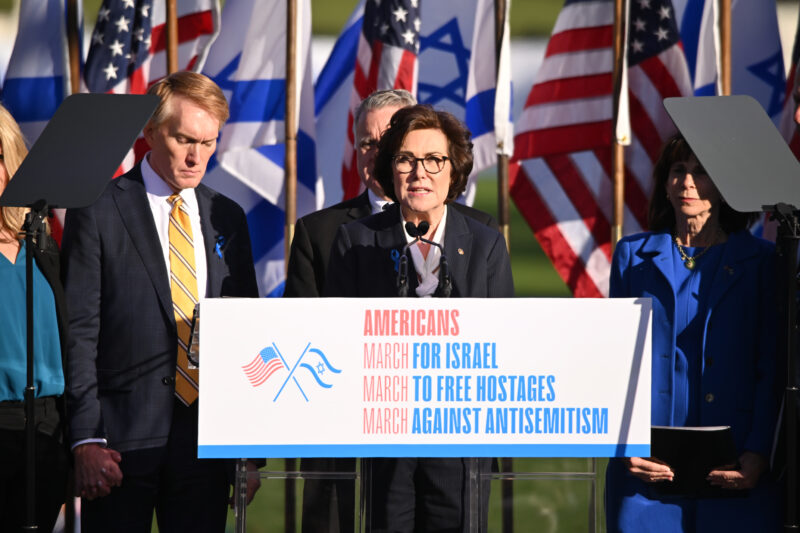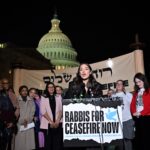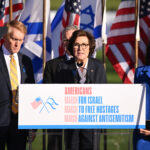Harvard Jewish leaders, alumni disappointed by antisemitism task force recommendations
The preliminary suggestions were divided into six areas: clarify Harvard’s values; act against discrimination, bullying, harassment and hate; improve disciplinary processes; implement education and training; foster constructive dialogue; and support Jewish life on campus

JOSEPH PREZIOSO/AFP via Getty Images
People walk through Harvard Yard at Harvard University in Cambridge, Massachusetts on December 12, 2023.
A six-page set of preliminary recommendations released on Wednesday by a Harvard University task force focused on combating antisemitism at the school falls short of expectations set by Jewish faculty, alumni and a member of the school’s previous antisemitism advisory group who spoke to Jewish Insider shortly after the document’s release.
The recommendations in Wednesday’s report included ones that could immediately be put into action, such as marking pork products in dining facilities and creating a webpage on the school’s site to provide information on Jewish holidays for university community members. The report also urged the implementation of two long-term actions: “the administration should institute anti-harassment training for all students” and for teaching fellows, “antisemitism and anti-Israeli bias need to be included in training for these essential employees.”
The suggestions, which interim President Alan Garber is expected to review, were divided into six areas: clarify Harvard’s values; act against discrimination, bullying, harassment and hate; improve disciplinary processes; implement education and training; foster constructive dialogue; and support Jewish life on campus.
The document lacks “comments about hiring faculty, interim and full-time, about rethinking DEI [diversity, equity and inclusion] and ensuring sanctions against those who have called for violence,” Rabbi David Wolpe, a former member of a separate antisemitism advisory group that the elite university formed last year amid an academic year marked by strife for Jewish students, told JI.
Wolpe added that the recommendations are missing “[affirmation that Zionism is a] legitimate and even praiseworthy ideal.”
Harvard Jewish leaders and alumni echoed Wolpe’s dissatisfaction with the preliminary recommendations.
“None of this addresses the pervasive and systemic nature of antisemitism … I’m incredibly disappointed and frustrated,” Shabbos Kestenbaum, who graduated in the spring with a master’s degree from Harvard Divinity School, told JI. Kestenbaum called the report “a slap in the face.”
“There’s nothing in here about the hiring and firing of faculty members, nothing in here about examining the pernicious and dangerous role that diversity, equity and inclusion has played in antisemitism, there are no recommendations or even a mention of security at Harvard Chabad and Hillel,” Kestenbaum, who in March spoke to a roundtable organized by the House Committee on Education and the Workforce about the antisemitism he experienced on Harvard’s campus, said. “Of the more concrete policy recommendations, those were just obvious and had been stated months ago by students themselves and by Congress,” he said.
Rabbi Hirschy Zarchi, who leads Harvard Chabad, said that the recommendations are “glaringly missing what is exposed and visible for all to see.”
On X, Zarchi cited several examples, noting that the school “still employs deans and faculty who brazenly and defiantly violate university code of conduct and incite students to do the same” and “Harvard maintains an official academic relationship with Birzeit University. Besides the fact that I don’t believe there’s a university in Israel that Harvard has a similar relationship with, this particular institution’s student government (among other entities there) supports Hamas. This makes the relationship not only immoral but likely illegal.”
The list of recommendations, which resulted from dozens of listening sessions, according to the task force, primarily featured suggestions that focus on short-term actionable items rather than long-term structural changes. The group said it would release a list of long-term measures in the fall, which could include “a detailed analysis of how Harvard got into its current crisis of community and lay out proposals to transform our University culture for the better over the medium- and long-term.”
Kestenbaum emphasized that the antisemitism task force “was not elected and does not speak for Jewish students.” The task force came under scrutiny immediately after it was formed in January for naming professor Derek Penslar, a historian and the director of Harvard’s Center for Jewish Studies, as co-chair. Penslar’s appointment drew the ire of Jewish communal leaders and prominent figures at Harvard over comments he made earlier this year minimizing concerns over antisemitism at Harvard, and for past statements he has made about Israel, including signing a letter in August that accused Israel of ethnic cleansing and of implementing “a regime of apartheid” against Palestinians. Penslar stepped down as co-chair in February.
The task force — aimed at cracking down on the antisemitism that has dramatically increased on the Ivy League campus since the Oct. 7 Hamas terror attacks in Israel — was established on the heels of an antisemitism advisory group created by then-President Claudine Gay in November. The advisory group featured prominent outside members, including writer Dara Horn and Wolpe, who stepped down after Gay’s widely criticized Capitol Hill testimony in December.
Also on Wednesday, the committee formed to support Harvard’s Muslim, Arab and Palestinian communities released a nine-page set of preliminary recommendations to combat Islamophobia on campus.







































